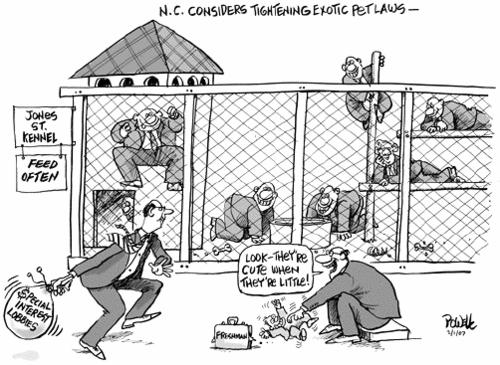2009 Legislation
News:
NC Legislature agrees to new ownership, enclosure rules
for pythons, crocodiles 7/15/2009
TEXT of Passed SB 307
Senate Bill 307 2009-2010 Session
Regulate Ownership & Use of Certain Reptiles.
In the news:
North Carolina legislators hold hearing on bill regulating
reptile ownership 3/5/2009
2008 Issues
NCARK: Public Comment Extended on SB1477 Ban
Bill 3/17/2008
PDF or
MSDOC
NCARK:
Call To
Action: SB1477 Ban Bill 3/11/2008
NCARK:
USFWS Proposal Would Ban Boas & Pythons
2/2/2008
NCARK:
Dr.
Jones, Director of NC Zoo, Continues to Lobby for Animal Rights
1/9/2008
NCARK: Animal
Protection Institute Attacks Jack Hanna
MSDOC or
PDF
1/1/2008
NCARK: Summer
2007
Newsletter
NCARK:
Animal Protection Institute Files Ban Bill S1477 with NC
Senate Spring 2007
2008 Legislation
Senate Bill 1788 - Regulate Dangerous Animals
TEXT
House Bill 2403 - Regulate
Dangerous Animals TEXT
Draft out of the S1477 study group
4/24/2008
Show
Your Opposition to Animal Rights Sponsored Anti Exotic Animal Legislation NOW!
In 2007, Senator Ed Jones and Representative Earl
Jones introduced animal rights bills, S 1477 and HB 1614, to prohibit the
private ownership of exotic animals.
At the end of the 2007 legislature, a subcommittee of the Senate Judiciary
Committee recommended that this issue be sent to a Legislative Study Committee.
Now, meetings are being held before the Committee to discuss S 1477 and HB 1614,
and we need your help to be sure this legislation will be defeated.
OPPOSITION TO HB 1614 By Elizabeth
Pensgard, Executive Secretary RDOWS
2007 Legislation
Latest
news:
Exotic animal ban tamed August 8, 2007
Center sinks teeth into fight for wild animals
August 4, 2007
Comments from Mindy
Stinner of Conservator's center
News:
Animal conservationists worry about proposed bill
Jul 9, 2007
Who should keep exotic animals? Jul 8, 2007
What are the odds ? Jul 8, 2007
N.C.'s exotic animal legislation goes too
far Jul 8, 2007
Animals: the new terror Jul 5, 2007
Critics still wary of exotic animal rules
Jul 03, 2007
Exotic animal ban vote delayed Jul 3, 2007
Backers tone down exotic animal ban June
29, 2007
Pythons, boas dropped from proposed exotic animal ban
Jun. 29, 2007
Exotic animal ban one step closer in N.C.
June 28, 2007
Roar greets bill to ban risky animals
June
18, 2007
REXANO Opposes
House Bill 1614
(= S1477) Inherently
Dangerous Animals
Sponsor: Representative
Earl Jones
04/18/2007 [H] Filed
04/19/2007 [H] Passed 1st Reading
04/19/2007 [H] Ref to the Com on Environment and Natural Resources and, if
favorable, to the Com on Judiciary I
Senate Bill 1477
(= H1614) Inherently
Dangerous Animals
Sponsor: Senator Ed Jones
03/22/2007 [S] Filed
03/26/2007 [S] Ref To Com On Judiciary II (Criminal)
As reported in the news:
What scares a lion keeper? Talk of an exotic animal
ban
Owners of once-wild pets band to fight proposed regulations
1/31/2007
Committee Recommends Exotic Animal Ban
1/29/2007
State may consider ban on exotic animals
1/23/2007

Escaped lions and tigers and snakes, oh my!
This post was written by snakegetters on 20
January, 2007
<snip>
Today the Cape Fear Serpentarium in Wilmington, North Carolina recieved a
remarkably well staged phone call purporting to be a complaint about one of our
anacondas getting loose and eating a pet dog. The voices involved were not those
of children, and the sound effects quite realistic.
The Serpentarium has never had anacondas, and we are certainly not missing any
giant snakes (or any other animals in our well secured and valuable collection).
Today’s temperatures in Wilmington ranged from 31 to 56 degrees. Absolutely none
of the giant constrictors and very few reptiles in the world will voluntarily
ingest food at 56 degrees, as it would be likely to result in their death. An
ectotherm’s biological processes are completely temperature-dependent, and
digestion simply would not take place at this temperature, leading to
putrefaction in the gut and probable death for the animal. Most reptiles would
not even be able to move, or could move only very slowly and weakly, while
exposed to temperatures in this range. Constriction would certainly be
impossible.
In New Hanover county, calls to the 911 dispatch system that involve reptile
emergencies are referred to me. I am responsible for the removal and relocation
of nuisance reptiles in this county. We perform this service on a volunteer
basis to serve our community. I phoned the 911 dispatcher to determine whether
this anaconda incident had any basis whatsoever in fact. I was not particularly
surprised to learn that no actual reptile emergencies had been reported today.
In short, here they come again. There may be quite an upcoming media storm if
the animal rights activists continue to follow their usual pattern of
manufacturing “dangerous exotic wildlife” incidents during pending legislation.
Animal rights shenanigans to close neighborhood
zoos
This post was written by snakegetters on 22
January, 2007
<snip>
In 2006, under the appointment of the North Carolina General Assembly, a study
committee began to debate new legislation to regulate “inherently dangerous
exotic animals” in North Carolina. This committee was mandated to consult with
and represent the interests of 12 groups that would be affected by the proposed
legislation, including exotic animal owners, breeders, educators, small zoos and
attractions. However, five of the 12 groups named seemed to have been completely
left out of this process, while the “humane groups” including animal rights
activists were significantly over-represented.
In addition, some rather odd shenanigans went on when the zoo and sanctuary
folks who had been left out tried to find out what was going on. In violation of
North Carolina’s Open Meetings Act, a “sunshine law”, we were told that the
meetings were closed to the public. Legally they cannot be. What was going on
that we were not supposed to know about?
This much we do know. SB1032 was originally written by API (Animal Protection
Institute), an animal rights advocacy group from Sacramento, California. API’s
stated goals are to ban or severely restrict not only zoos and other animal
attractions, but all “human use” of animals including farming, hunting, fishing,
pet keeping and meat eating. API is quite open about their ultimate agenda and
about taking public credit for authoring this bill. We, the independent zoo and
wildlife professionals of North Carolina, are very concerned that their
activities in North Carolina may lead to the closing of local zoos and
attractions statewide if they are left unchecked.
Even though API is openly anti-zoo and opposes all captive wildlife, they were
invited into our state by Lorraine Smith, Curator of Mammals at the Asheboro
Zoo. Our tax dollars support the Asheboro Zoo, since they do not bring in
anywhere near enough revenue to be self supporting. Yet they are asking the
state for a government granted coercive monopoly on the entire zoo and wildlife
industry in this state, closing down all other zoos and wildlife facilities
including rescue sanctuaries. And the zoo director is currently chairing the
study group legislative advisory committee that will help decide whether any
other zoos will be allowed to operate in the state of North Carolina.
We don’t think it would be a good idea for the director of WalMart to chair a
committee that helps decide whether to pass a law that bans all stores in North
Carolina that are not owned by WalMart. Unfortunately that is exactly what is
happening in our legislature right now. Between animal rights extremists from
California and the only zoo in the state that would benefit economically from a
ban, this committee’s composition is not likely to produce a decision that
fairly represents the best interests of North Carolina.
Tanith Tyrr, Curator of Reptiles at the Cape Fear Serpentarium, says “It’s a bit
of a bizarre situation, as we’re the folks who actually help and rescue wild
animals and advocate for their welfare, and we find ourselves on the opposite
side of a very nasty war with these “animal rights” people. I’d like to see any
of them pick up an injured rattlesnake and give it antibiotics and
rehabilitation care before releasing it back into the wild, which is what we do.
Or provide veterinary care and housing for unwanted, abandoned or abused big
cats for the rest of their lives, which is what CCI does. We do what the big
zoos can’t or won’t for lack of time and space. We’re the ones out there really
helping and rescuing animals.
“We are the independent zoo and wildlife professionals of the state of North
Carolina, and we are the evil that these so-called animal rights people are
fighting against. We do not abuse animals. We help and rescue them, and we
educate your children to respect animals and the environment they live in.
<snip>


